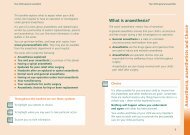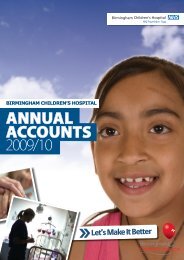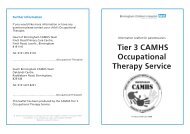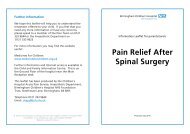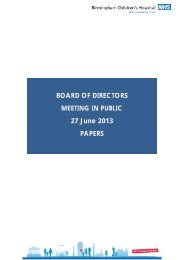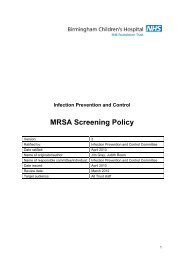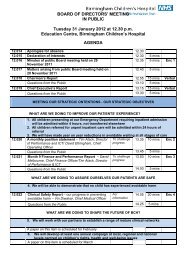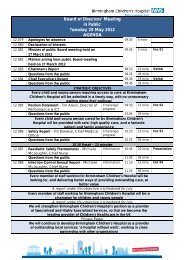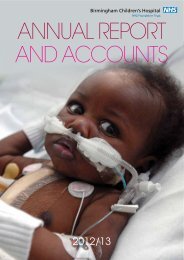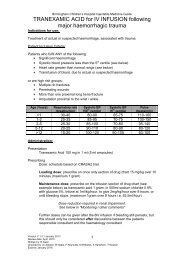Board Meeting Agenda July 2012 - Birmingham Children's Hospital
Board Meeting Agenda July 2012 - Birmingham Children's Hospital
Board Meeting Agenda July 2012 - Birmingham Children's Hospital
Create successful ePaper yourself
Turn your PDF publications into a flip-book with our unique Google optimized e-Paper software.
Ref. Item Action<br />
12.088 Infection Control Annual Report<br />
MM and DJG presented the report to the <strong>Board</strong> with the following highlights:<br />
• Last year was the start of a new era for infection control. We had previously<br />
put a lot of time and resource into getting the basics right. Last year we felt<br />
ready to set some challenging objectives, particularly around reducing central<br />
line infections, which is one of the most common types of healthcare<br />
associated infections we see, and reducing antibiotic usage.<br />
• These stretch objectives have been met with room to spare. We aimed to<br />
achieve 25% reduction in line infections and we achieved 33%; we aimed to<br />
achieve 10% reduction in antibiotics and achieved 14%.<br />
• There is a lot more we can do and we have set a further objective that no<br />
child will experience an avoidable infection at BCH. First we have to define<br />
what is ‘avoidable’.<br />
• There is also more we can do on antibiotic usage, ensuring there is no delay<br />
in getting antibiotics and discontinuing them as soon as appropriate.<br />
• The DoH mandatory surveillance changed focus last year from MRSA which<br />
has a low prevalence in paediatrics, to MSSA, which is in the top three<br />
causes of bacteraemia within BCH and most other children’s hospitals. The<br />
target concerned us but by working with parenteral nutrition and<br />
gastroenterology we were able to meet it. Learning from this work will be<br />
applied to Haematology/Oncology.<br />
The <strong>Board</strong> discussed the following points:<br />
• How we compare to other hospitals and is there anything we can learn from<br />
them.<br />
We have been consistently the best performing of the paediatric hospitals in<br />
relation to the DoH measures. It is difficult to compare ourselves on MSSA<br />
with other hospitals because the figures in the public domain are unclear.<br />
• The need to continue to embed the message that infection control is<br />
everyone’s responsibility and that by taking simple measures we can meet<br />
our targets.<br />
• Whether further improvements can be made in relation to blood culture<br />
contamination.<br />
Unnecessary laboratory investigations are bad for the patient and for the<br />
hospital. This is a cultural issue and DJG’s team is working with clinicians to<br />
make use of labs more appropriate.<br />
• Whether there is any cause for concern about infection control compliance<br />
connected with our capacity pressures.<br />
There are no concerns. We have a larger population of infected patients than<br />
most organisations and have a cultural appreciation of infection as a risk. All<br />
infections are monitored weekly and any hospital acquired investigations are<br />
investigated through root cause analysis.<br />
The <strong>Board</strong> congratulated DJG and MM on the successes; approved the report<br />
and confirmed support of the plans to develop infection prevention and control<br />
in line with the Trust’s strategic objectives.<br />
8



